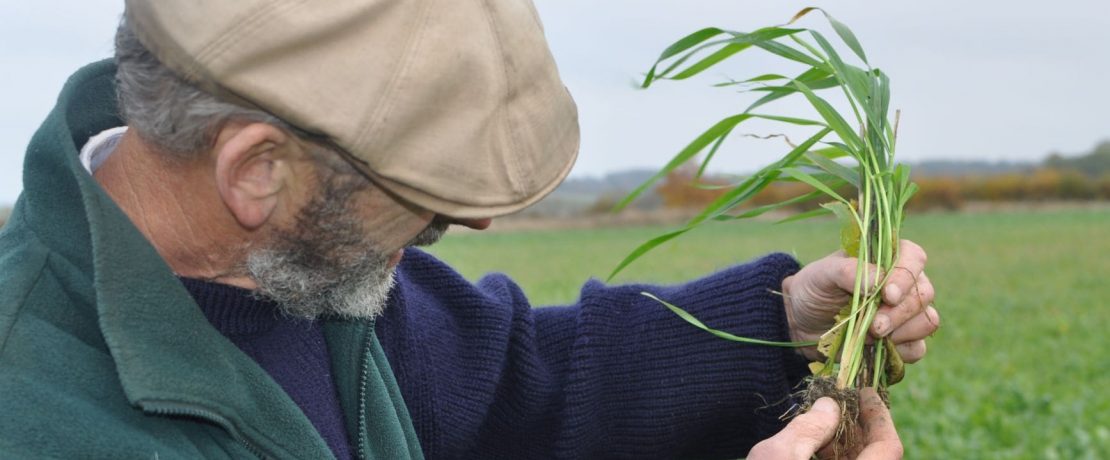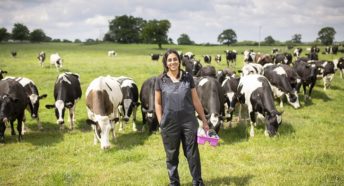The farmers bringing their soils back to life
The thin layer of soil covering the earth’s surface is the difference between survival and extinction for most living things.
It’s easy to overlook, but that thin layer does many important jobs. It supports the plants that provide food, fibre, fuel – and much more besides. It cleans and filters excess water to recharge underground stocks. And, most importantly, soil is the ultimate digestive system, decomposing all that lived and recycling it to enable new life.
So it’s vital that we take care of our soils, and farmers across the country are leading the way: trying new and innovative farming methods that avoid the traditional ploughing, artificial fertilisers and pesticides that are damaging this important ecosystem.
We spoke to two farmers who are passionate about restoring the abundance of life below our feet. Their successes are proof that great food and healthy soil can go together.
John Cherry, Weston Park Farm in Hertfordshire
Brothers John and Paul Cherry have managed the farm at Weston for more than 30 years, growing wheat, barley, oats, beans and peas, alongside a herd of beef cattle.
In the 1970s and ’80s they, like many others, were enthusiastic about chasing high yields by any means possible: maximum ploughing, plenty of fertilisers, chemicals and other additions. But over time, this took its toll on their soils.
At a loss as to what to do, John visited two farms that used no-till methods: growing crops without ploughing and disturbing the soil. It was a revelation, and the farm moved to a full no-till system from 2010.
The benefits have been huge. With no-till, the brothers need fewer tractors so machinery costs are lower. Staff get to go home at 4.30pm while neighbouring farmers are working their fields day and night. They use far less fertiliser and chemicals. It’s true that yields are down and can vary – but costs are down by more.
The brothers’ greatest achievement to date is to have successfully launched ‘Groundswell’, the first dedicated no-till show and conference in the UK. Hosted on the farm each June, the show brings together engaged and innovative farmers and scientists from across the globe to learn from each other about soils, and how farming can contribute to restoring and sustaining them.
Fidelity Weston, Romshed Farm in Kent
Romshed is a 70-hectare historic farmstead in the High Weald Area of Outstanding Natural Beauty. The farm was run down and buildings derelict when Fidelity Weston and her husband Martin bought it in 1984. They set about renovating and managing it with conservation and wildlife at the forefront of their minds.
The main livestock are sheep – 150 Lleyn ewes with 200 lambs – and a herd of 60 Hereford cattle with a resident bull. All are reared on pasture and wildflower-rich forage, and spend as much of their lives outdoors as conditions allow. The farm has begun using organic methods, including stopping using artificial nitrate fertiliser. Around 40% of the land now has 15-40 species per square metre, a level usually only seen in unimproved grassland.
Visits to two farms in Kent inspired Fidelity to try a new method of grazing her cows – one that helps keep soil healthy. Cattle are now moved regularly from paddock to paddock to fresh grass every one to four days and managed with a lightweight electric fence. This means that instead of eating all of the grass down to the ground, the cattle now only eat the top third – leaving grass better able to recover, and to develop larger root systems that help build soil structure.
Romshed Farm produces high quality food sustainably for a good price – and it has cut its costs. It’s supporting good soils, rich conservation pastures and beautiful landscape. These should all stand the farm in good stead for the changes in farming policy and funding ahead. But the ideal for Fidelity would be a market which recognises the value of pasture-fed livestock and rewards farmers for doing what is good for the land, the animals and the people who eat their meat.





